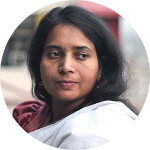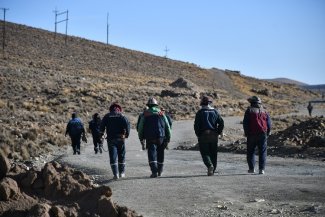Millions of workers, traders and farmers, with different ideologies and political linkages, came together last week to protest against the recent decisions of the ruling government, the United Progressive Alliance (UPA).
The protest, or “bandh” in Hindi, was the response to the government’s attempt to open up the multi-brand retail trade to foreign supermarket chains, the price hike in diesel, and the limiting to six Liquefied petroleum gas (LPG) cylinders per year for a household.
The bandh had evoked a mixed response, especially in the Bharatiya Janata Party (BJP) ruled states as well as in the Left-dominated areas.
While the government’s recent initiatives showed that it was determined to assert its neoliberal line in an effort to stave off criticism from international advocates of the market driven policies, the general strike showed that there was a tremendous resistance to these moves from the grassroots, although from varied political perspectives and nuances.
“In our colony, there are many households who live by weaving baskets. Ramshankar Bhai, the small retailer in Jungpura, buys our baskets. We are told that he is in trouble and so will not buy our products. How are we going to survive?” asks Bina, a basket-weaving woman from Nandnagri, Delhi.
“We are already in debt, and if there are no takers for the vegetables we cultivate, what will happen to us?” asks Nandalal, a small-scale farmer from Yamuna banks.
“The government had barred foreign direct investment in retailing since 1997, and so the foreign retailers could enter only through franchising agreements. But now, with 51 percent stake they can easily do away with us,” says Naresh Yadav, a small trader in Delhi.
The protest call given was well taken by the masses.
Almost all major markets were closed throughout India, and the public transport in major cities was off the road, which resulted in low attendance in schools and colleges.
Trains were blocked by political activists of BJP, Samajwadi Party (SP), Communist Party of India-Marxist (CPI-M), Communist Party of India (CPI), Telugu Desam Party (TDP), Biju Janata Dal (BJD), Janata Dal Secular (JDS), All-India Forward Bloc (AIFB) and Revolutionary Socialist Party (RSP), in many places including Bihar, Uttar Pradesh, West Bengal, Orissa and Jharkhand.
Banks, markets, shops and educational institutions were seen closed in Manipur, Meghalaya and Jharkhand.
The impact of the strike in Mumbai was not much, since the Shiv Sena and the Maharashtra Navnirman Sena stayed away in view of the ongoing Ganesh festival.
Kerala witnessed only a few demonstrations by political parties since a total strike action, or ‘hartal’, for the same cause was organised there on 15 September 2012 by BJP as well as the Left parties. DMK, a close ally of UPA, participated in the strike in Tamil Nadu.
CPI(M) General Secretary Prakash Karat said, “Opening the multi-brand retail trade to foreign supermarket chains will endanger the livelihoods of more than 40 million people engaged in retail trade. We will not give up until the government rolls back its decision.”
“The All-India Motor Transport Congress (AIMTC) has increased freight charges across the country by 15 percent following the hike in diesel prices. Now the poor and middle class will have to bear the brunt of it, since the already increased prices of vegetables and essential commodities will shoot up uncontrollably,” says Amarjit Kaur, national leader, CPI.
Behind the politricks
Nevertheless, while disparate political parties seem to be in unison here, some hidden agenda could well be lurking behind these ‘politricks’.
For example, the BJP and the Left, known ideology rivals, have shared the same platform of protest at Jantar Mantar.
Mulayam Singh, the so-called outside supporter for the ruling Congress, vehemently participated in the day’s struggle and courted arrest along with Left leaders.
In a situation where Mamata Banerjee’s Trinamool Congress has withdrawn support to UPA, and where the Samajwadi Party has assured support to the government, the position taken up by Mulayam Singh Yadav– supporting with criticism –has to be taken with a pinch of salt.
On 17 September 2012, Mulayam Singh in his media address, after the two-day national executive of his party, had explicitly stated that a Third Front – the alternative for ruling congress and the main opposition party the BJP – was in the offing by 2014 general elections to Parliament.
Anyway, amidst the protestors’ hue and cry, the government, stating that FDI is good for farmers, since they will have a reliable market at higher prices and also that consumers will get goods at a cheaper rate, has passed the notification for proceeding with 51 per cent FDI, along with other suggested economic reforms.









